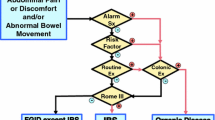Opinion statement
Determining which patients with irritable bowel syndrome (IBS) are “refractory” is highly subjective. The duration, severity, and type of symptoms and a host of other epidemiologic and psychosocial factors play a role in this determination. Long duration of symptoms alone does not portray the severe IBS patient. Several studies have shown that patients concerned with pain rather than altered bowel habits (diarrhea and constipation) are more likely to be disabled by their disease. Pragmatically, refractory patients can be defined as those who fail to improve on multiple drug regimens and who have high health care utilization despite aggressive therapy. In some cases, psychosocial and psychiatric comorbidity can also contribute to an inability to improve despite reasonable medical management. Finally, IBS patients who are unhappy about their care and who have the unrealistic expectation of “cure” may become refractory. The key to dealing with so-called “refractory” IBS patients is to understand that their behaviors often relate to underlying needs that the patients may have difficulty communicating to the physician. Unfortunately, these patients are often labeled as “difficult,” “unpleasant,” or “crazy,” and are often dismissed by their treating physicians. This leads to a continued cycle of pain, frustration, and health care over-utilization, with patients seeking the elusive “cure.” Failure to understand these correlates leads to continued frustration and treatment failure, which unfortunately often characterizes the care of these patients.
Similar content being viewed by others
References and Recommended Reading
Drossman DA, McKee D, Candler R, et al.: Psychosocial factors in the irritable bowel syndrome. A multivariate study of patients and nonpatients with irritable bowel syndrome. Gastroenterology 1998, 95:701–708. This is a classic study showing that IBS patients who seek care are probably driven to do so as much by psychological distress as they are by IBS symptoms.
Leserman J, Li Z, Drossman DA, et al.: Impact of sexual and physical abuse dimensions on health status: development of an abuse severity measure. Psychosom Med 1997, 59:152–160.
Drossman DA, Leserman J, Nachman G, et al.: Sexual and physical abuse in women with functional or organic gastrointestinal disorders. Ann Intern Med 1990, 113:828–833.
Friedman LS, Samet JH, Roberts MS, et al.: Inquiry about victimization experiences: a survey of patient preferences and physician practices. Arch Intern Med 1992, 152:1186–1190.
Brandt LH: Holding a hand is often as important as examining one. Am J Gastroenterol 1993, 88:1817–1821.
Drossman DA, Talley NJ, Leserman J, et al.: Sexual and physical abuse and gastrointestinal illness: review and recommendations. Ann Intern Med 1995, 123:782–794.
Olden KW, Drossman DA: Psychological and psychiatric aspects of gastrointestinal disease. Med Clin North Am 2000, 84:1313–1327.
Guthrie EA, Creed FH, Dawson D, et al.: A randomized controlled trial of psychotherapy in patients with refractory irritable bowel syndrome. Br J Psychiatry 1993, 163:315–321.
Olden KW: Refractory GI symptoms: a combined medical psychiatric approach. Semin Gastrointest Dis 1999, 10:37–45.
Sperber A, Alzmon Y, Neumann L, et al.: Fibromyalgia in the irritable bowel syndrome: studies of prevalence and clinical implications. Am J Gastroenterol 1999, 94:3541–3546.
Onghena P, Van Houdenhove B: Antidepressant-induced analgesia in chronic non-malignant pain: a metaanalysis of 39 placebo-controlled studies. Pain 1992, 49:205–219.
Budavari I, Olden KW: Psychosocial aspects of functional gastrointestinal disorders. Gastroenterol Clin North Am 2003, 32:447–506.
Creed FH, Fernandes L, Guthrie EA, et al.: The costeffectiveness of psychotherapy and paroxetine for severe irritable bowel syndrome. Gastroenterology 2003, 124:303–317. This is an excellent study demonstrating the effectiveness of multimodal treatment in severe IBS.
Drossman DA, Toner BB, Whitehead WE, et al.: Cognitivebehavioral therapy versus education and desipramine versus placebo for moderate to severe functional bowel disorders. Gastroenterology 2003, 125:19–31. This is a landmark study showing the effectiveness of behavioral therapy in the treatment of IBS. It also shows a considerable benefit of using desipramine for IBS in the per-protocol analysis.
Author information
Authors and Affiliations
Rights and permissions
About this article
Cite this article
Olden, K.W., Brown, A.R. Treatment of the severe refractory irritable bowel patient. Curr Treat Options Gastro 9, 324–330 (2006). https://doi.org/10.1007/s11938-006-0014-7
Issue Date:
DOI: https://doi.org/10.1007/s11938-006-0014-7




